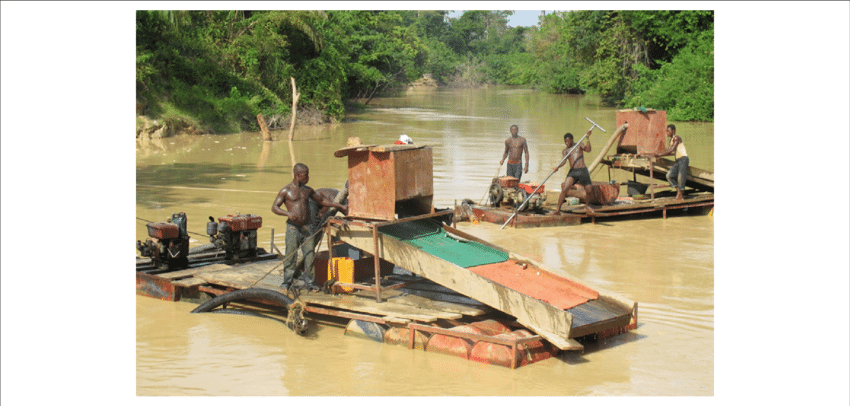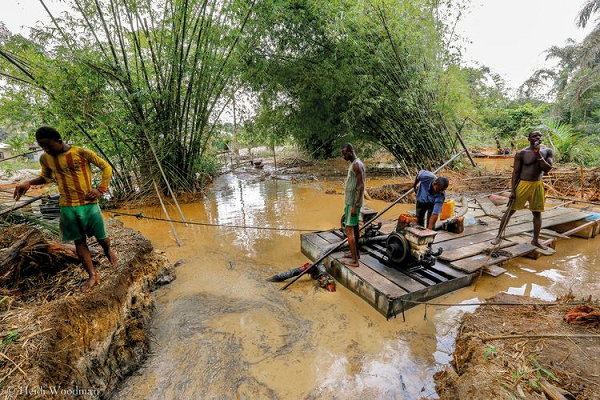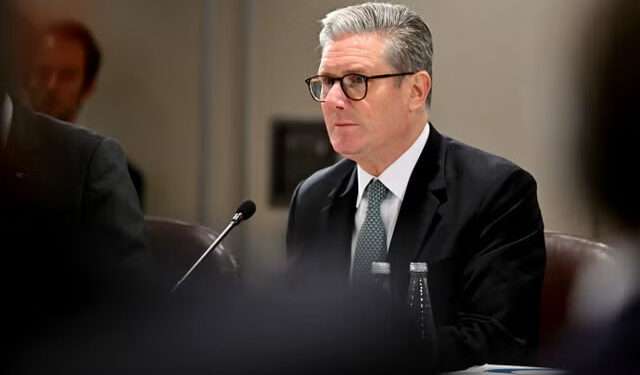The Ghana National Association of Small-Scale Miners (GNASSM) has called on the government to impose restrictions on the importation of ‘changfa’ engines as part of a broader strategy to halt illegal mining activities in the country’s rivers.
Godwin Armah, General Secretary of GNASSM, stressed that restricting the importation of changfa engines is a critical step towards minimizing illegal mining in Ghana’s rivers.
“[Government] should restrict the importation of these changfa machines. You have one Chinese importing a thousand into the country while we know over 90 percent end up on our water bodies.”
Godwin Armah, General Secretary of GNASSM
Mr. Armah’s comments underscored the Association’s belief that cracking down on the availability of changfa engines could be a game-changer in the fight against illegal mining, locally known as ‘galamsey.’
Changfa engines, which are imported from China, play a crucial role in the mining sector in Ghana. While these engines have legitimate uses in industries such as agriculture, they are increasingly being exploited by illegal miners to dredge riverbeds in search of gold.
The engines are mounted on boat-like machines made of barrels and steel, with compartments designed to separate sand and gold. The sand, after being washed for gold, is dumped back into the rivers, causing severe pollution and siltation.
The boats, often referred to as changfa boats, have been central to illegal river mining activities, leading to extensive environmental damage, including water pollution and the destruction of aquatic ecosystems.
This is particularly concerning as many of Ghana’s rivers serve as sources of drinking water for communities and towns.
The conversation around protecting Ghana’s rivers from the scourge of illegal mining has intensified in recently, especially as key rivers, including the Pra and Ankobra, have experienced worsening pollution.
The Ghana Water Company has repeatedly raised alarms over the rising turbidity levels in several water bodies, warning of potential water shortages if these destructive activities are not curbed. Higher turbidity in water bodies makes the water more difficult and expensive to treat, placing additional strain on the country’s water supply infrastructure.
Calls for Stronger Regulation

In response to this ongoing challenge, Mr. Armah of the GNASSM emphasized the need for stronger regulatory measures. He believes that limiting the importation of changfa engines and ensuring tighter controls over their distribution could be an effective way to reduce illegal mining in water bodies.
“Once we restrict it, they will not have access to it, and those who have the license to import them will do so. In every district, we can have two outlets so we can manage them properly,”
Godwin Armah, General Secretary of GNASSM
This proposal is aimed at ensuring that only licensed and legitimate miners have access to the engines, preventing their misuse by illegal miners.
The GNASSM also advocated for “enhanced monitoring and law enforcement alongside the restriction of changfa imports.”
According to Mr. Armah, security forces should be deployed to river bodies to ensure compliance and swiftly remove any illegal mining operations. He stressed that these efforts need to be sustained over the long term if the country’s rivers are to be protected from further degradation.
This includes not only targeting the importation of the engines but also cracking down on their use in illegal mining operations, as well as providing alternative livelihoods for those involved in galamsey.
The fight against galamsey, requires sustained commitment from both the government and local stakeholders. Only through comprehensive regulatory measures, consistent enforcement, and public awareness can Ghana’s rivers be safeguarded for future generations.
REA ALSO: Société Générale Submits Share Acquisition List to Bank of Ghana Amidst Ongoing Bidding





















